Leadership Impact in Achieving Organizational Goals at Accenture
VerifiedAdded on 2021/04/21
|12
|2952
|65
Report
AI Summary
This research proposal investigates the impact of leadership on achieving organizational goals, using Accenture as a case study. The study explores leadership strategies, their effects on employee motivation, and their influence on organizational performance. It begins with a literature review covering the role of leadership, definitions of leadership, and the impact of leadership styles on organizational performance. The research questions focus on leadership strategies used by Accenture's management and the impact of leadership on organizational goals. The methodology includes a positivism philosophy, primary research using surveys and interviews, and a sampling strategy involving 180 employees and three managers. Ethical considerations are addressed to ensure the integrity and credibility of the research. The proposal aims to understand the role of leaders in Accenture, identify issues affecting goal achievement, analyze suitable leadership styles, and determine their long-term impact.
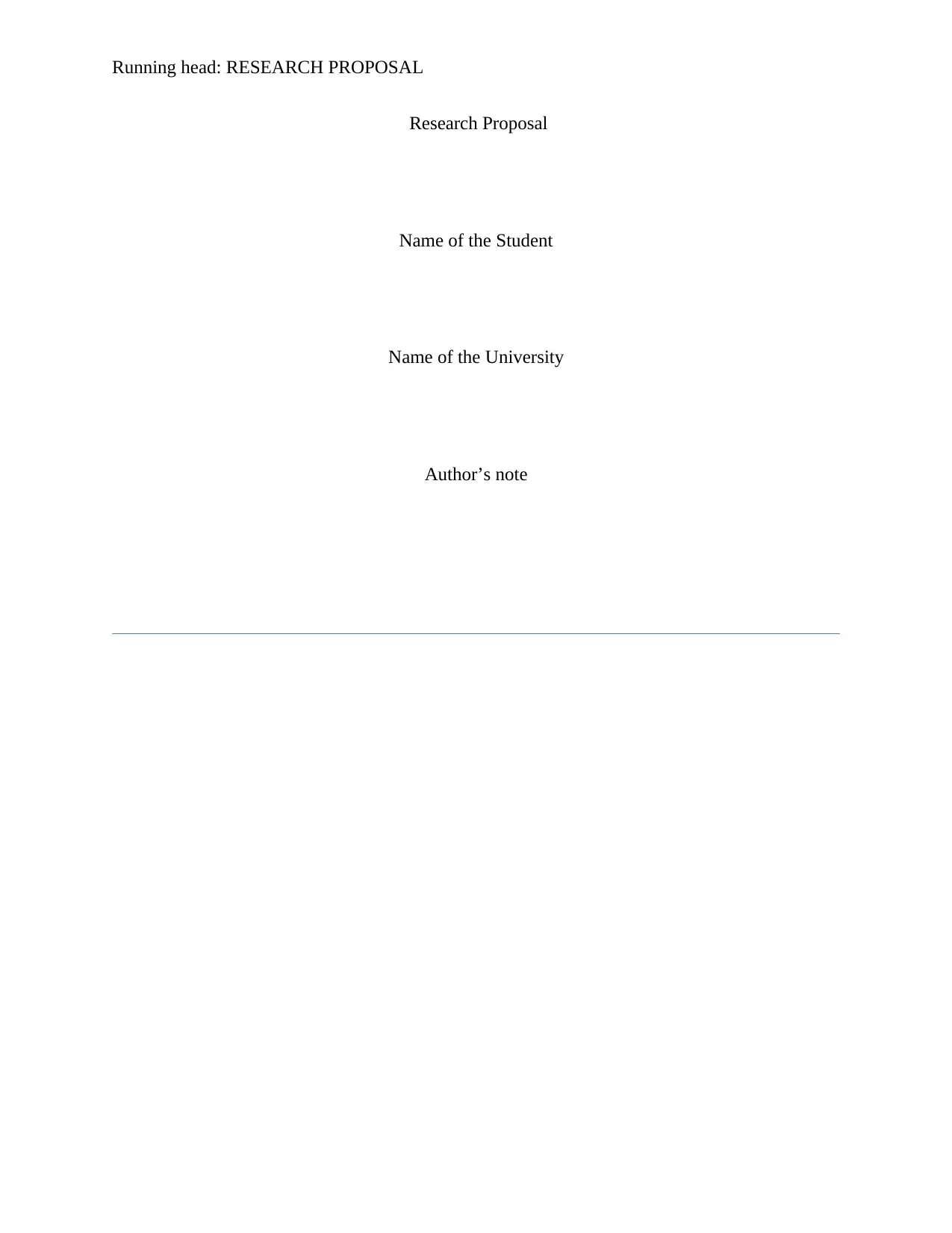
Running head: RESEARCH PROPOSAL
Research Proposal
Name of the Student
Name of the University
Author’s note
Research Proposal
Name of the Student
Name of the University
Author’s note
Paraphrase This Document
Need a fresh take? Get an instant paraphrase of this document with our AI Paraphraser
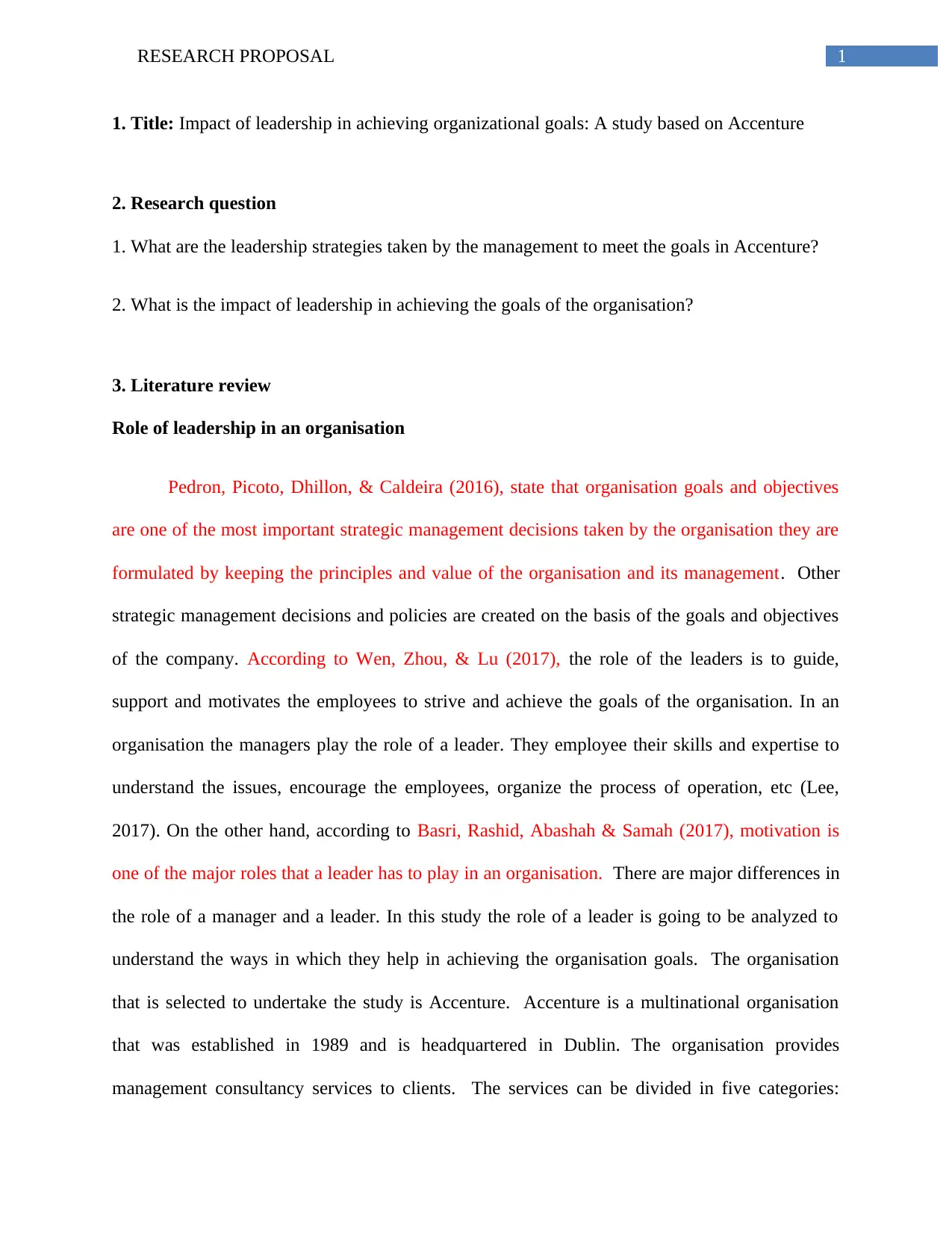
1RESEARCH PROPOSAL
1. Title: Impact of leadership in achieving organizational goals: A study based on Accenture
2. Research question
1. What are the leadership strategies taken by the management to meet the goals in Accenture?
2. What is the impact of leadership in achieving the goals of the organisation?
3. Literature review
Role of leadership in an organisation
Pedron, Picoto, Dhillon, & Caldeira (2016), state that organisation goals and objectives
are one of the most important strategic management decisions taken by the organisation they are
formulated by keeping the principles and value of the organisation and its management. Other
strategic management decisions and policies are created on the basis of the goals and objectives
of the company. According to Wen, Zhou, & Lu (2017), the role of the leaders is to guide,
support and motivates the employees to strive and achieve the goals of the organisation. In an
organisation the managers play the role of a leader. They employee their skills and expertise to
understand the issues, encourage the employees, organize the process of operation, etc (Lee,
2017). On the other hand, according to Basri, Rashid, Abashah & Samah (2017), motivation is
one of the major roles that a leader has to play in an organisation. There are major differences in
the role of a manager and a leader. In this study the role of a leader is going to be analyzed to
understand the ways in which they help in achieving the organisation goals. The organisation
that is selected to undertake the study is Accenture. Accenture is a multinational organisation
that was established in 1989 and is headquartered in Dublin. The organisation provides
management consultancy services to clients. The services can be divided in five categories:
1. Title: Impact of leadership in achieving organizational goals: A study based on Accenture
2. Research question
1. What are the leadership strategies taken by the management to meet the goals in Accenture?
2. What is the impact of leadership in achieving the goals of the organisation?
3. Literature review
Role of leadership in an organisation
Pedron, Picoto, Dhillon, & Caldeira (2016), state that organisation goals and objectives
are one of the most important strategic management decisions taken by the organisation they are
formulated by keeping the principles and value of the organisation and its management. Other
strategic management decisions and policies are created on the basis of the goals and objectives
of the company. According to Wen, Zhou, & Lu (2017), the role of the leaders is to guide,
support and motivates the employees to strive and achieve the goals of the organisation. In an
organisation the managers play the role of a leader. They employee their skills and expertise to
understand the issues, encourage the employees, organize the process of operation, etc (Lee,
2017). On the other hand, according to Basri, Rashid, Abashah & Samah (2017), motivation is
one of the major roles that a leader has to play in an organisation. There are major differences in
the role of a manager and a leader. In this study the role of a leader is going to be analyzed to
understand the ways in which they help in achieving the organisation goals. The organisation
that is selected to undertake the study is Accenture. Accenture is a multinational organisation
that was established in 1989 and is headquartered in Dublin. The organisation provides
management consultancy services to clients. The services can be divided in five categories:
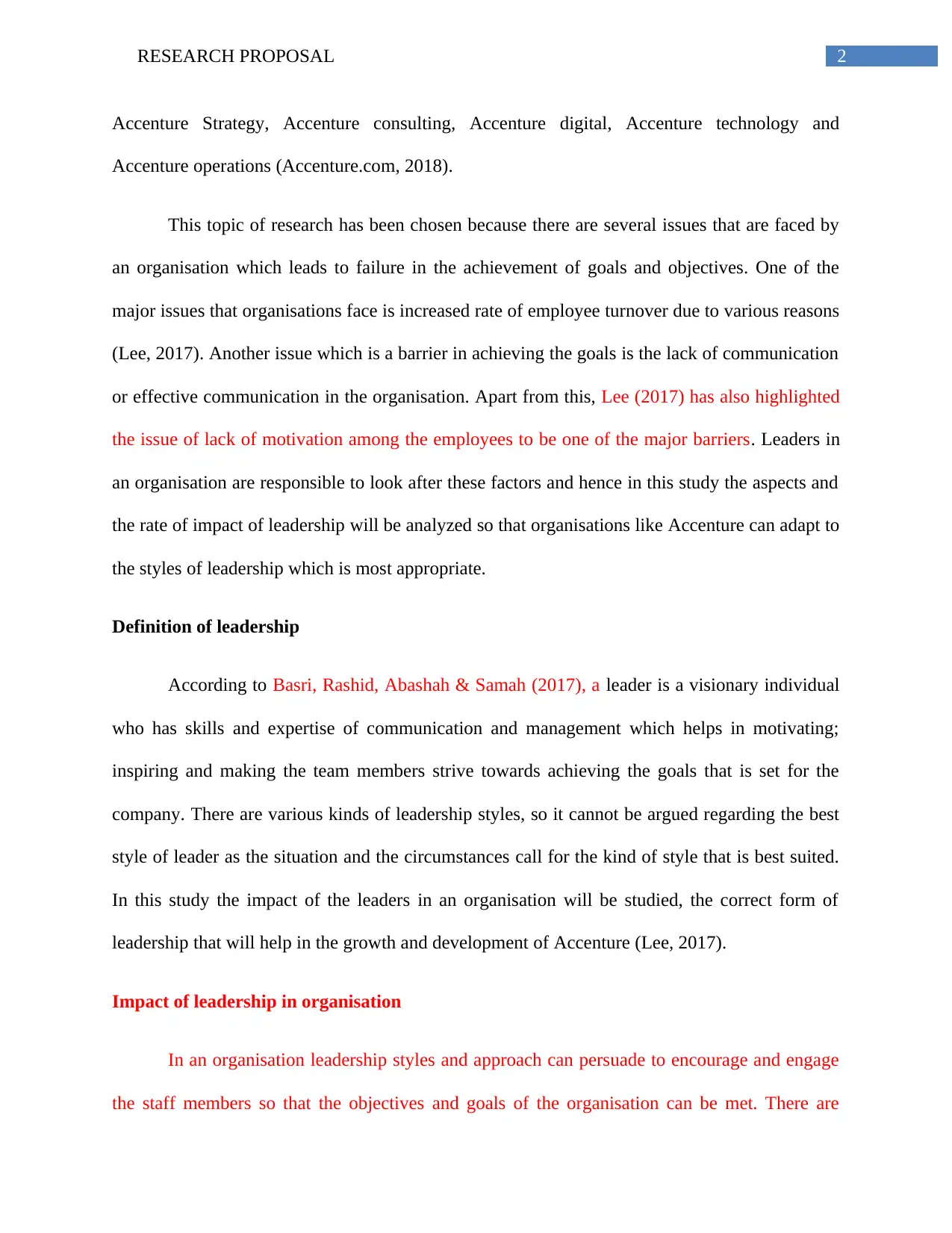
2RESEARCH PROPOSAL
Accenture Strategy, Accenture consulting, Accenture digital, Accenture technology and
Accenture operations (Accenture.com, 2018).
This topic of research has been chosen because there are several issues that are faced by
an organisation which leads to failure in the achievement of goals and objectives. One of the
major issues that organisations face is increased rate of employee turnover due to various reasons
(Lee, 2017). Another issue which is a barrier in achieving the goals is the lack of communication
or effective communication in the organisation. Apart from this, Lee (2017) has also highlighted
the issue of lack of motivation among the employees to be one of the major barriers. Leaders in
an organisation are responsible to look after these factors and hence in this study the aspects and
the rate of impact of leadership will be analyzed so that organisations like Accenture can adapt to
the styles of leadership which is most appropriate.
Definition of leadership
According to Basri, Rashid, Abashah & Samah (2017), a leader is a visionary individual
who has skills and expertise of communication and management which helps in motivating;
inspiring and making the team members strive towards achieving the goals that is set for the
company. There are various kinds of leadership styles, so it cannot be argued regarding the best
style of leader as the situation and the circumstances call for the kind of style that is best suited.
In this study the impact of the leaders in an organisation will be studied, the correct form of
leadership that will help in the growth and development of Accenture (Lee, 2017).
Impact of leadership in organisation
In an organisation leadership styles and approach can persuade to encourage and engage
the staff members so that the objectives and goals of the organisation can be met. There are
Accenture Strategy, Accenture consulting, Accenture digital, Accenture technology and
Accenture operations (Accenture.com, 2018).
This topic of research has been chosen because there are several issues that are faced by
an organisation which leads to failure in the achievement of goals and objectives. One of the
major issues that organisations face is increased rate of employee turnover due to various reasons
(Lee, 2017). Another issue which is a barrier in achieving the goals is the lack of communication
or effective communication in the organisation. Apart from this, Lee (2017) has also highlighted
the issue of lack of motivation among the employees to be one of the major barriers. Leaders in
an organisation are responsible to look after these factors and hence in this study the aspects and
the rate of impact of leadership will be analyzed so that organisations like Accenture can adapt to
the styles of leadership which is most appropriate.
Definition of leadership
According to Basri, Rashid, Abashah & Samah (2017), a leader is a visionary individual
who has skills and expertise of communication and management which helps in motivating;
inspiring and making the team members strive towards achieving the goals that is set for the
company. There are various kinds of leadership styles, so it cannot be argued regarding the best
style of leader as the situation and the circumstances call for the kind of style that is best suited.
In this study the impact of the leaders in an organisation will be studied, the correct form of
leadership that will help in the growth and development of Accenture (Lee, 2017).
Impact of leadership in organisation
In an organisation leadership styles and approach can persuade to encourage and engage
the staff members so that the objectives and goals of the organisation can be met. There are
⊘ This is a preview!⊘
Do you want full access?
Subscribe today to unlock all pages.

Trusted by 1+ million students worldwide
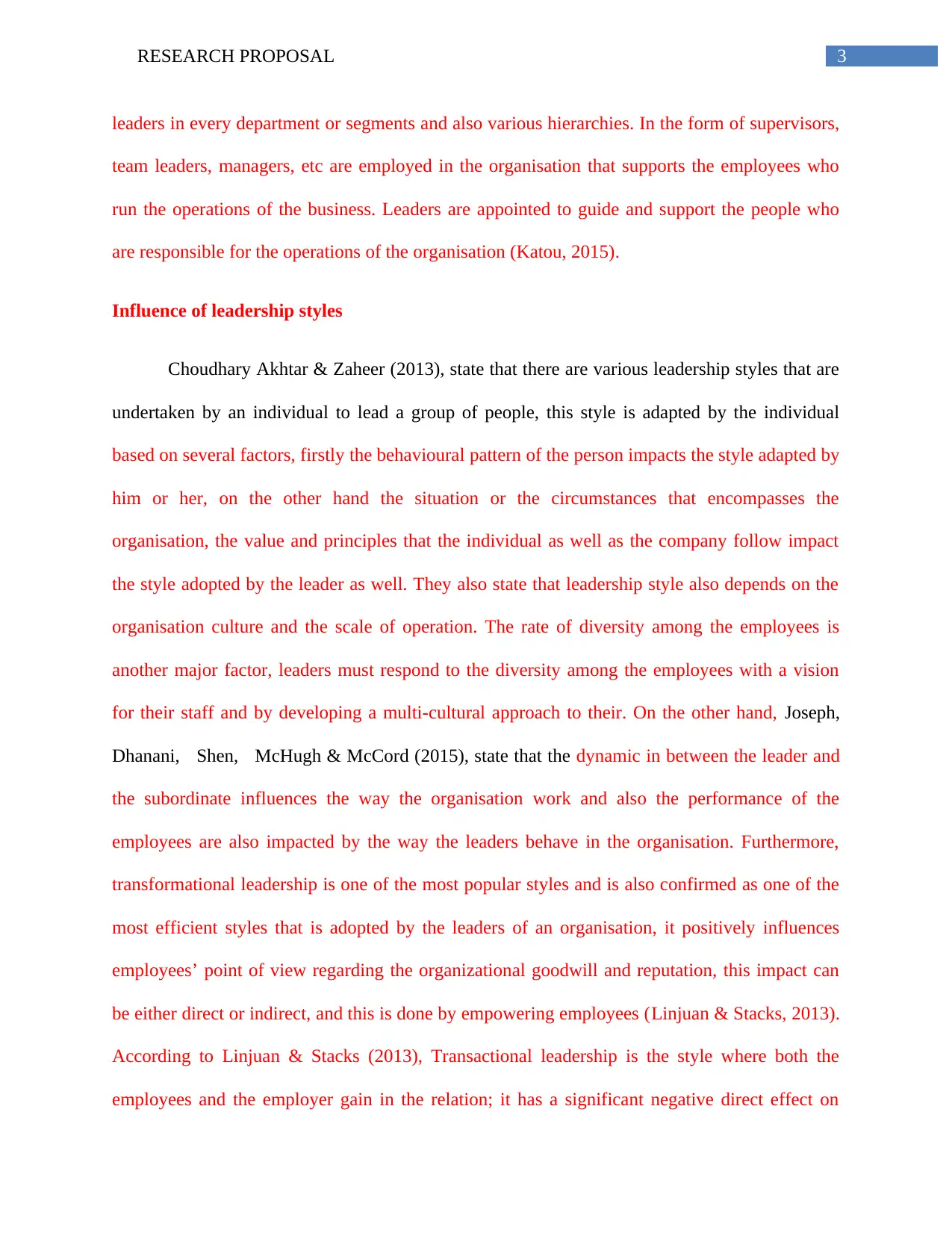
3RESEARCH PROPOSAL
leaders in every department or segments and also various hierarchies. In the form of supervisors,
team leaders, managers, etc are employed in the organisation that supports the employees who
run the operations of the business. Leaders are appointed to guide and support the people who
are responsible for the operations of the organisation (Katou, 2015).
Influence of leadership styles
Choudhary Akhtar & Zaheer (2013), state that there are various leadership styles that are
undertaken by an individual to lead a group of people, this style is adapted by the individual
based on several factors, firstly the behavioural pattern of the person impacts the style adapted by
him or her, on the other hand the situation or the circumstances that encompasses the
organisation, the value and principles that the individual as well as the company follow impact
the style adopted by the leader as well. They also state that leadership style also depends on the
organisation culture and the scale of operation. The rate of diversity among the employees is
another major factor, leaders must respond to the diversity among the employees with a vision
for their staff and by developing a multi-cultural approach to their. On the other hand, Joseph,
Dhanani, Shen, McHugh & McCord (2015), state that the dynamic in between the leader and
the subordinate influences the way the organisation work and also the performance of the
employees are also impacted by the way the leaders behave in the organisation. Furthermore,
transformational leadership is one of the most popular styles and is also confirmed as one of the
most efficient styles that is adopted by the leaders of an organisation, it positively influences
employees’ point of view regarding the organizational goodwill and reputation, this impact can
be either direct or indirect, and this is done by empowering employees (Linjuan & Stacks, 2013).
According to Linjuan & Stacks (2013), Transactional leadership is the style where both the
employees and the employer gain in the relation; it has a significant negative direct effect on
leaders in every department or segments and also various hierarchies. In the form of supervisors,
team leaders, managers, etc are employed in the organisation that supports the employees who
run the operations of the business. Leaders are appointed to guide and support the people who
are responsible for the operations of the organisation (Katou, 2015).
Influence of leadership styles
Choudhary Akhtar & Zaheer (2013), state that there are various leadership styles that are
undertaken by an individual to lead a group of people, this style is adapted by the individual
based on several factors, firstly the behavioural pattern of the person impacts the style adapted by
him or her, on the other hand the situation or the circumstances that encompasses the
organisation, the value and principles that the individual as well as the company follow impact
the style adopted by the leader as well. They also state that leadership style also depends on the
organisation culture and the scale of operation. The rate of diversity among the employees is
another major factor, leaders must respond to the diversity among the employees with a vision
for their staff and by developing a multi-cultural approach to their. On the other hand, Joseph,
Dhanani, Shen, McHugh & McCord (2015), state that the dynamic in between the leader and
the subordinate influences the way the organisation work and also the performance of the
employees are also impacted by the way the leaders behave in the organisation. Furthermore,
transformational leadership is one of the most popular styles and is also confirmed as one of the
most efficient styles that is adopted by the leaders of an organisation, it positively influences
employees’ point of view regarding the organizational goodwill and reputation, this impact can
be either direct or indirect, and this is done by empowering employees (Linjuan & Stacks, 2013).
According to Linjuan & Stacks (2013), Transactional leadership is the style where both the
employees and the employer gain in the relation; it has a significant negative direct effect on
Paraphrase This Document
Need a fresh take? Get an instant paraphrase of this document with our AI Paraphraser
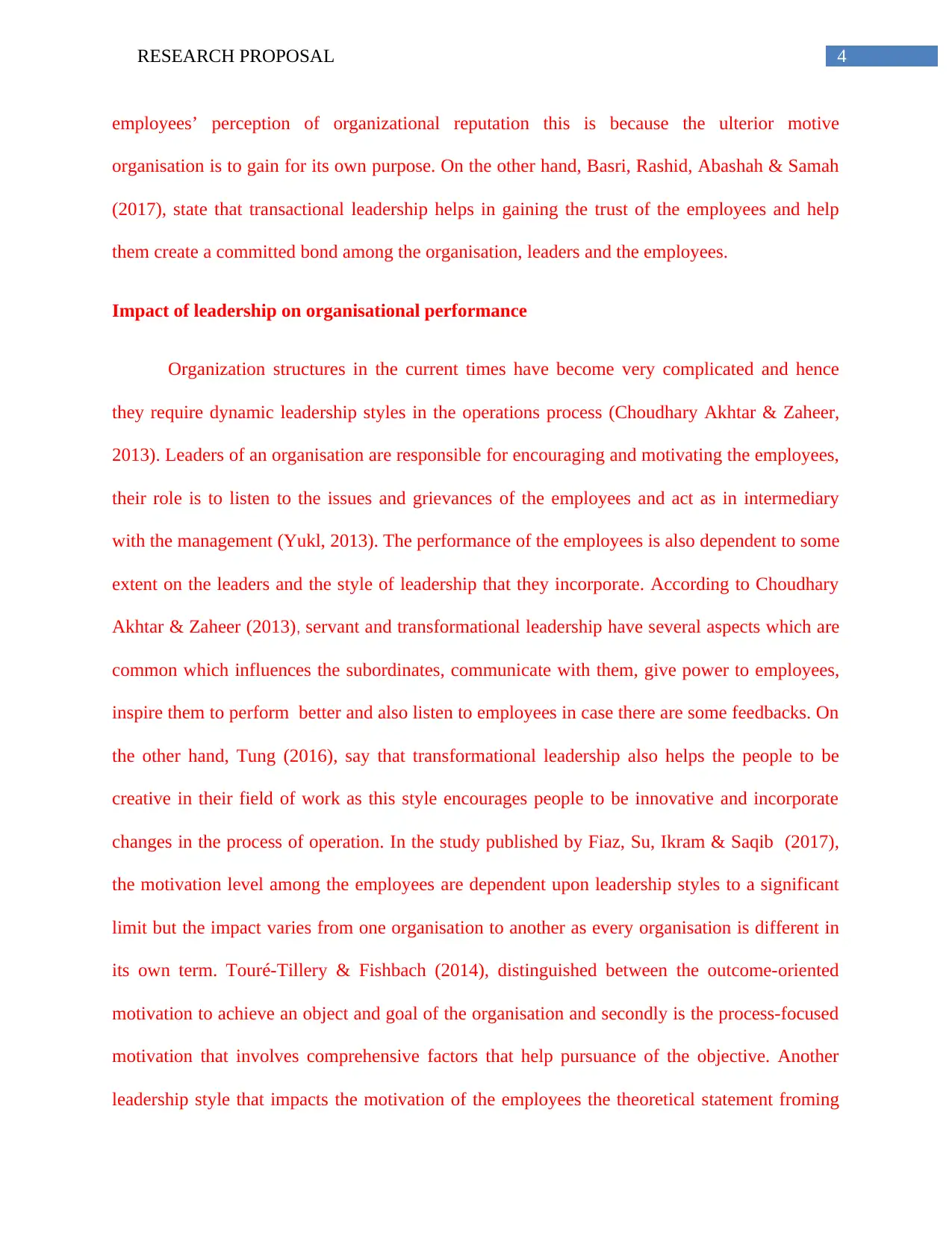
4RESEARCH PROPOSAL
employees’ perception of organizational reputation this is because the ulterior motive
organisation is to gain for its own purpose. On the other hand, Basri, Rashid, Abashah & Samah
(2017), state that transactional leadership helps in gaining the trust of the employees and help
them create a committed bond among the organisation, leaders and the employees.
Impact of leadership on organisational performance
Organization structures in the current times have become very complicated and hence
they require dynamic leadership styles in the operations process (Choudhary Akhtar & Zaheer,
2013). Leaders of an organisation are responsible for encouraging and motivating the employees,
their role is to listen to the issues and grievances of the employees and act as in intermediary
with the management (Yukl, 2013). The performance of the employees is also dependent to some
extent on the leaders and the style of leadership that they incorporate. According to Choudhary
Akhtar & Zaheer (2013), servant and transformational leadership have several aspects which are
common which influences the subordinates, communicate with them, give power to employees,
inspire them to perform better and also listen to employees in case there are some feedbacks. On
the other hand, Tung (2016), say that transformational leadership also helps the people to be
creative in their field of work as this style encourages people to be innovative and incorporate
changes in the process of operation. In the study published by Fiaz, Su, Ikram & Saqib (2017),
the motivation level among the employees are dependent upon leadership styles to a significant
limit but the impact varies from one organisation to another as every organisation is different in
its own term. Touré-Tillery & Fishbach (2014), distinguished between the outcome-oriented
motivation to achieve an object and goal of the organisation and secondly is the process-focused
motivation that involves comprehensive factors that help pursuance of the objective. Another
leadership style that impacts the motivation of the employees the theoretical statement froming
employees’ perception of organizational reputation this is because the ulterior motive
organisation is to gain for its own purpose. On the other hand, Basri, Rashid, Abashah & Samah
(2017), state that transactional leadership helps in gaining the trust of the employees and help
them create a committed bond among the organisation, leaders and the employees.
Impact of leadership on organisational performance
Organization structures in the current times have become very complicated and hence
they require dynamic leadership styles in the operations process (Choudhary Akhtar & Zaheer,
2013). Leaders of an organisation are responsible for encouraging and motivating the employees,
their role is to listen to the issues and grievances of the employees and act as in intermediary
with the management (Yukl, 2013). The performance of the employees is also dependent to some
extent on the leaders and the style of leadership that they incorporate. According to Choudhary
Akhtar & Zaheer (2013), servant and transformational leadership have several aspects which are
common which influences the subordinates, communicate with them, give power to employees,
inspire them to perform better and also listen to employees in case there are some feedbacks. On
the other hand, Tung (2016), say that transformational leadership also helps the people to be
creative in their field of work as this style encourages people to be innovative and incorporate
changes in the process of operation. In the study published by Fiaz, Su, Ikram & Saqib (2017),
the motivation level among the employees are dependent upon leadership styles to a significant
limit but the impact varies from one organisation to another as every organisation is different in
its own term. Touré-Tillery & Fishbach (2014), distinguished between the outcome-oriented
motivation to achieve an object and goal of the organisation and secondly is the process-focused
motivation that involves comprehensive factors that help pursuance of the objective. Another
leadership style that impacts the motivation of the employees the theoretical statement froming
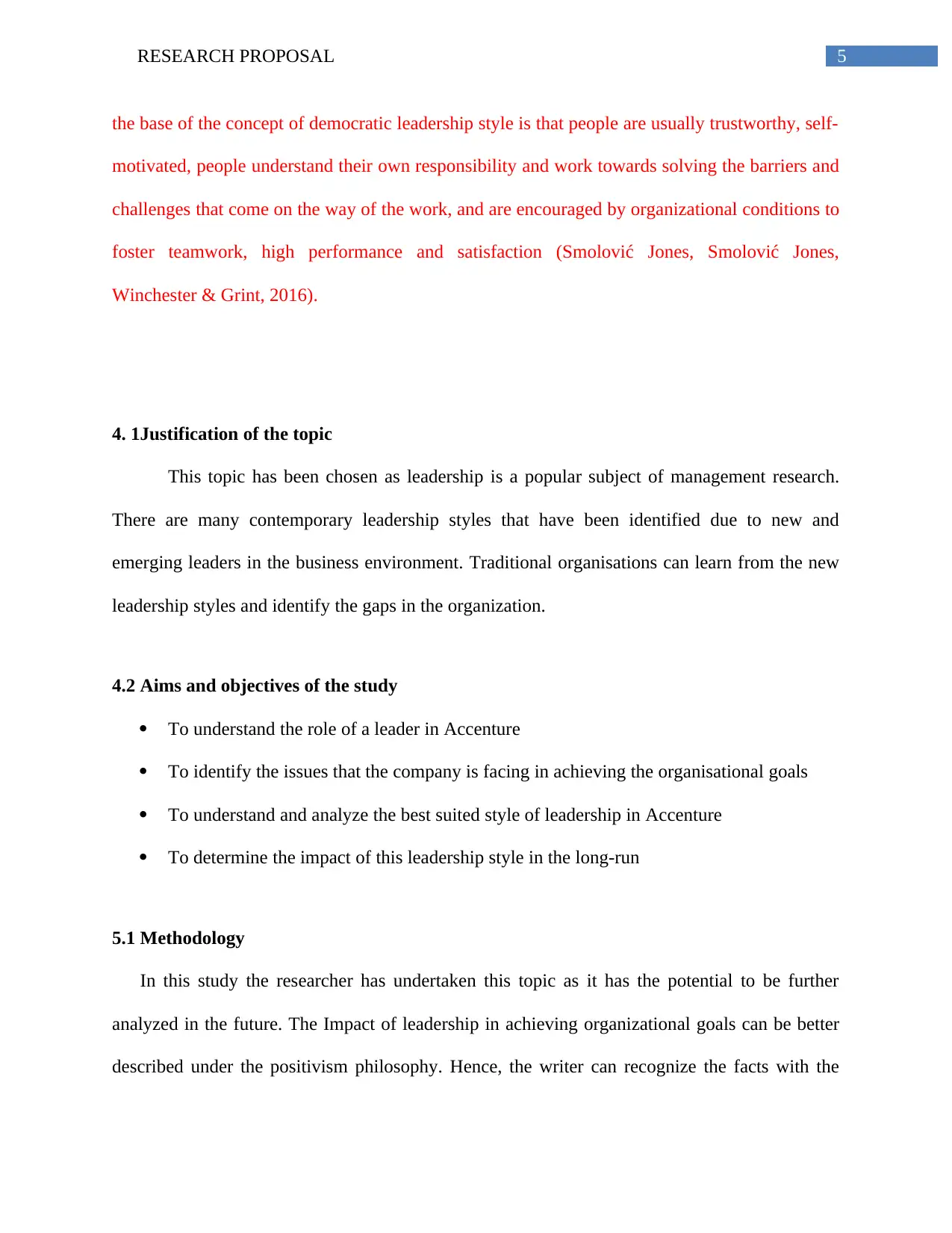
5RESEARCH PROPOSAL
the base of the concept of democratic leadership style is that people are usually trustworthy, self-
motivated, people understand their own responsibility and work towards solving the barriers and
challenges that come on the way of the work, and are encouraged by organizational conditions to
foster teamwork, high performance and satisfaction (Smolović Jones, Smolović Jones,
Winchester & Grint, 2016).
4. 1Justification of the topic
This topic has been chosen as leadership is a popular subject of management research.
There are many contemporary leadership styles that have been identified due to new and
emerging leaders in the business environment. Traditional organisations can learn from the new
leadership styles and identify the gaps in the organization.
4.2 Aims and objectives of the study
To understand the role of a leader in Accenture
To identify the issues that the company is facing in achieving the organisational goals
To understand and analyze the best suited style of leadership in Accenture
To determine the impact of this leadership style in the long-run
5.1 Methodology
In this study the researcher has undertaken this topic as it has the potential to be further
analyzed in the future. The Impact of leadership in achieving organizational goals can be better
described under the positivism philosophy. Hence, the writer can recognize the facts with the
the base of the concept of democratic leadership style is that people are usually trustworthy, self-
motivated, people understand their own responsibility and work towards solving the barriers and
challenges that come on the way of the work, and are encouraged by organizational conditions to
foster teamwork, high performance and satisfaction (Smolović Jones, Smolović Jones,
Winchester & Grint, 2016).
4. 1Justification of the topic
This topic has been chosen as leadership is a popular subject of management research.
There are many contemporary leadership styles that have been identified due to new and
emerging leaders in the business environment. Traditional organisations can learn from the new
leadership styles and identify the gaps in the organization.
4.2 Aims and objectives of the study
To understand the role of a leader in Accenture
To identify the issues that the company is facing in achieving the organisational goals
To understand and analyze the best suited style of leadership in Accenture
To determine the impact of this leadership style in the long-run
5.1 Methodology
In this study the researcher has undertaken this topic as it has the potential to be further
analyzed in the future. The Impact of leadership in achieving organizational goals can be better
described under the positivism philosophy. Hence, the writer can recognize the facts with the
⊘ This is a preview!⊘
Do you want full access?
Subscribe today to unlock all pages.

Trusted by 1+ million students worldwide
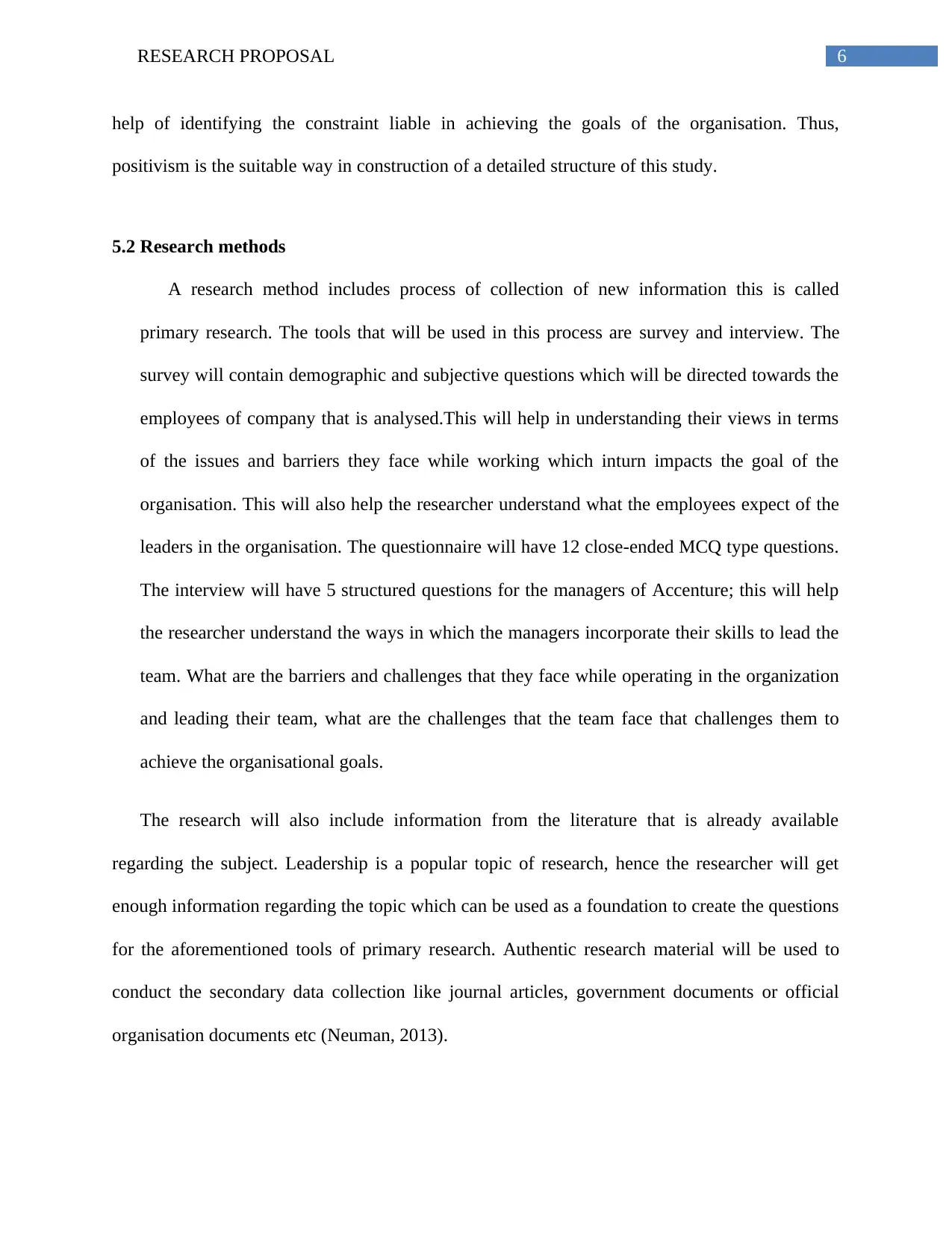
6RESEARCH PROPOSAL
help of identifying the constraint liable in achieving the goals of the organisation. Thus,
positivism is the suitable way in construction of a detailed structure of this study.
5.2 Research methods
A research method includes process of collection of new information this is called
primary research. The tools that will be used in this process are survey and interview. The
survey will contain demographic and subjective questions which will be directed towards the
employees of company that is analysed.This will help in understanding their views in terms
of the issues and barriers they face while working which inturn impacts the goal of the
organisation. This will also help the researcher understand what the employees expect of the
leaders in the organisation. The questionnaire will have 12 close-ended MCQ type questions.
The interview will have 5 structured questions for the managers of Accenture; this will help
the researcher understand the ways in which the managers incorporate their skills to lead the
team. What are the barriers and challenges that they face while operating in the organization
and leading their team, what are the challenges that the team face that challenges them to
achieve the organisational goals.
The research will also include information from the literature that is already available
regarding the subject. Leadership is a popular topic of research, hence the researcher will get
enough information regarding the topic which can be used as a foundation to create the questions
for the aforementioned tools of primary research. Authentic research material will be used to
conduct the secondary data collection like journal articles, government documents or official
organisation documents etc (Neuman, 2013).
help of identifying the constraint liable in achieving the goals of the organisation. Thus,
positivism is the suitable way in construction of a detailed structure of this study.
5.2 Research methods
A research method includes process of collection of new information this is called
primary research. The tools that will be used in this process are survey and interview. The
survey will contain demographic and subjective questions which will be directed towards the
employees of company that is analysed.This will help in understanding their views in terms
of the issues and barriers they face while working which inturn impacts the goal of the
organisation. This will also help the researcher understand what the employees expect of the
leaders in the organisation. The questionnaire will have 12 close-ended MCQ type questions.
The interview will have 5 structured questions for the managers of Accenture; this will help
the researcher understand the ways in which the managers incorporate their skills to lead the
team. What are the barriers and challenges that they face while operating in the organization
and leading their team, what are the challenges that the team face that challenges them to
achieve the organisational goals.
The research will also include information from the literature that is already available
regarding the subject. Leadership is a popular topic of research, hence the researcher will get
enough information regarding the topic which can be used as a foundation to create the questions
for the aforementioned tools of primary research. Authentic research material will be used to
conduct the secondary data collection like journal articles, government documents or official
organisation documents etc (Neuman, 2013).
Paraphrase This Document
Need a fresh take? Get an instant paraphrase of this document with our AI Paraphraser
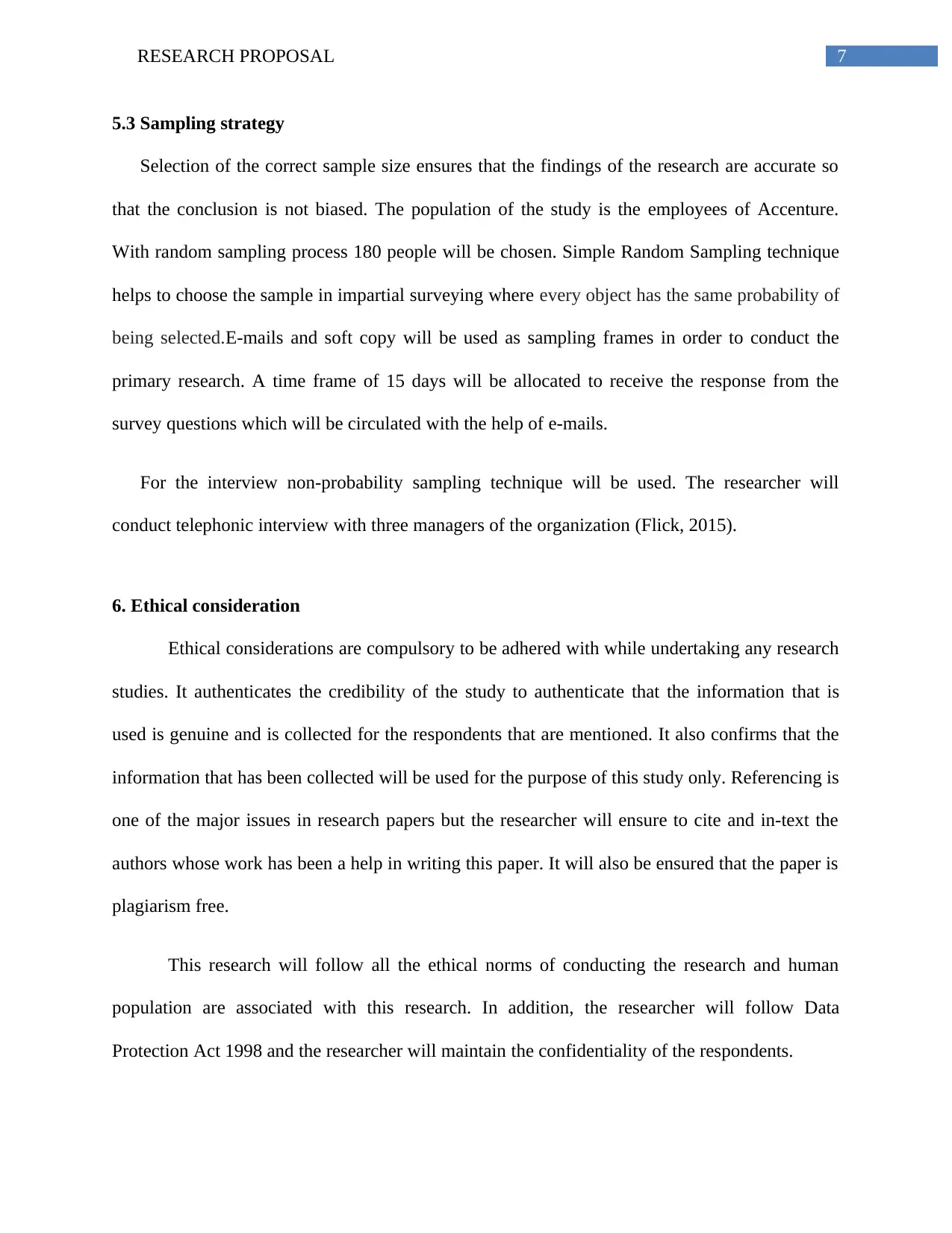
7RESEARCH PROPOSAL
5.3 Sampling strategy
Selection of the correct sample size ensures that the findings of the research are accurate so
that the conclusion is not biased. The population of the study is the employees of Accenture.
With random sampling process 180 people will be chosen. Simple Random Sampling technique
helps to choose the sample in impartial surveying where every object has the same probability of
being selected.E-mails and soft copy will be used as sampling frames in order to conduct the
primary research. A time frame of 15 days will be allocated to receive the response from the
survey questions which will be circulated with the help of e-mails.
For the interview non-probability sampling technique will be used. The researcher will
conduct telephonic interview with three managers of the organization (Flick, 2015).
6. Ethical consideration
Ethical considerations are compulsory to be adhered with while undertaking any research
studies. It authenticates the credibility of the study to authenticate that the information that is
used is genuine and is collected for the respondents that are mentioned. It also confirms that the
information that has been collected will be used for the purpose of this study only. Referencing is
one of the major issues in research papers but the researcher will ensure to cite and in-text the
authors whose work has been a help in writing this paper. It will also be ensured that the paper is
plagiarism free.
This research will follow all the ethical norms of conducting the research and human
population are associated with this research. In addition, the researcher will follow Data
Protection Act 1998 and the researcher will maintain the confidentiality of the respondents.
5.3 Sampling strategy
Selection of the correct sample size ensures that the findings of the research are accurate so
that the conclusion is not biased. The population of the study is the employees of Accenture.
With random sampling process 180 people will be chosen. Simple Random Sampling technique
helps to choose the sample in impartial surveying where every object has the same probability of
being selected.E-mails and soft copy will be used as sampling frames in order to conduct the
primary research. A time frame of 15 days will be allocated to receive the response from the
survey questions which will be circulated with the help of e-mails.
For the interview non-probability sampling technique will be used. The researcher will
conduct telephonic interview with three managers of the organization (Flick, 2015).
6. Ethical consideration
Ethical considerations are compulsory to be adhered with while undertaking any research
studies. It authenticates the credibility of the study to authenticate that the information that is
used is genuine and is collected for the respondents that are mentioned. It also confirms that the
information that has been collected will be used for the purpose of this study only. Referencing is
one of the major issues in research papers but the researcher will ensure to cite and in-text the
authors whose work has been a help in writing this paper. It will also be ensured that the paper is
plagiarism free.
This research will follow all the ethical norms of conducting the research and human
population are associated with this research. In addition, the researcher will follow Data
Protection Act 1998 and the researcher will maintain the confidentiality of the respondents.
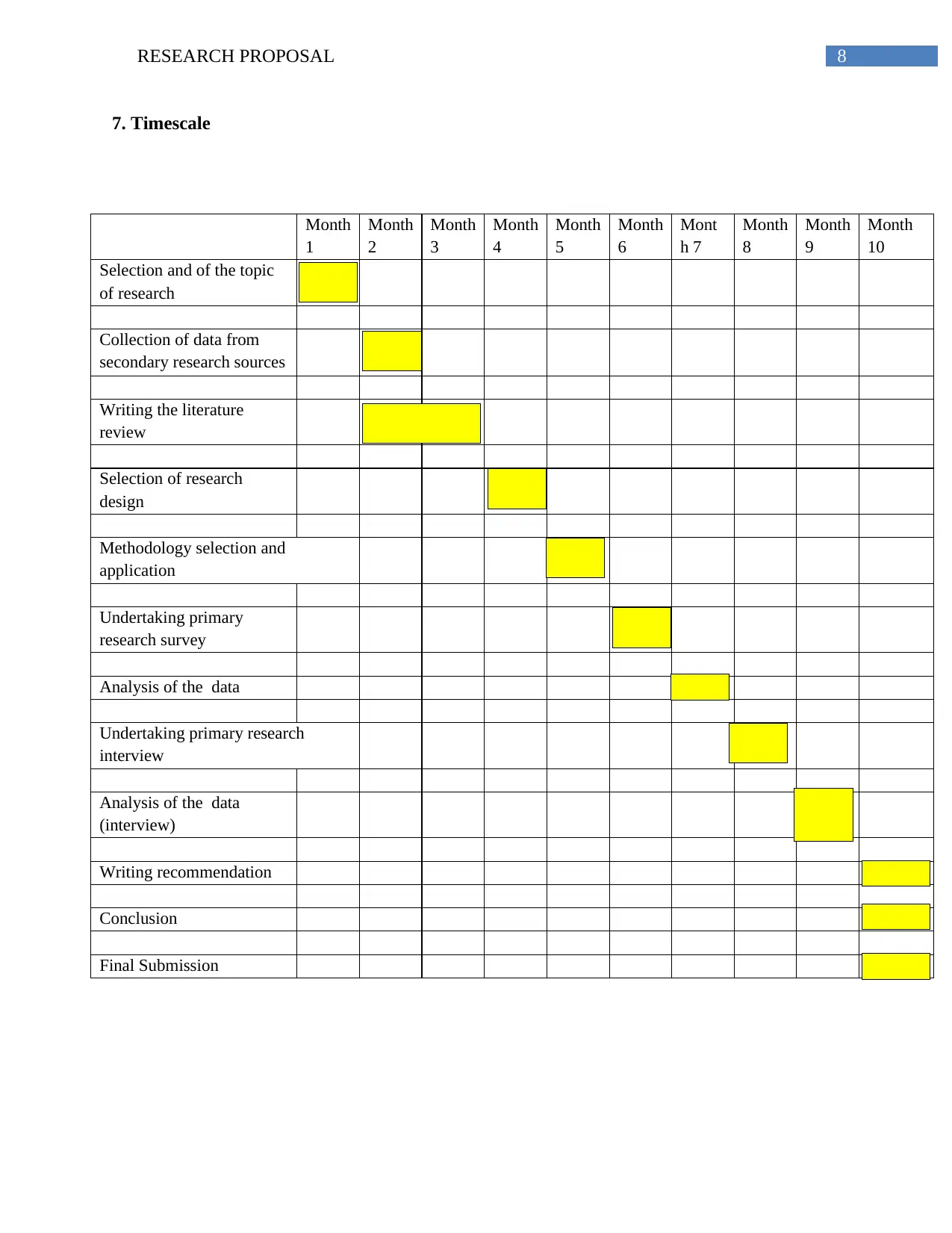
8RESEARCH PROPOSAL
7. Timescale
Month
1
Month
2
Month
3
Month
4
Month
5
Month
6
Mont
h 7
Month
8
Month
9
Month
10
Selection and of the topic
of research
Collection of data from
secondary research sources
Writing the literature
review
Selection of research
design
Methodology selection and
application
Undertaking primary
research survey
Analysis of the data
Undertaking primary research
interview
Analysis of the data
(interview)
Writing recommendation
Conclusion
Final Submission
7. Timescale
Month
1
Month
2
Month
3
Month
4
Month
5
Month
6
Mont
h 7
Month
8
Month
9
Month
10
Selection and of the topic
of research
Collection of data from
secondary research sources
Writing the literature
review
Selection of research
design
Methodology selection and
application
Undertaking primary
research survey
Analysis of the data
Undertaking primary research
interview
Analysis of the data
(interview)
Writing recommendation
Conclusion
Final Submission
⊘ This is a preview!⊘
Do you want full access?
Subscribe today to unlock all pages.

Trusted by 1+ million students worldwide
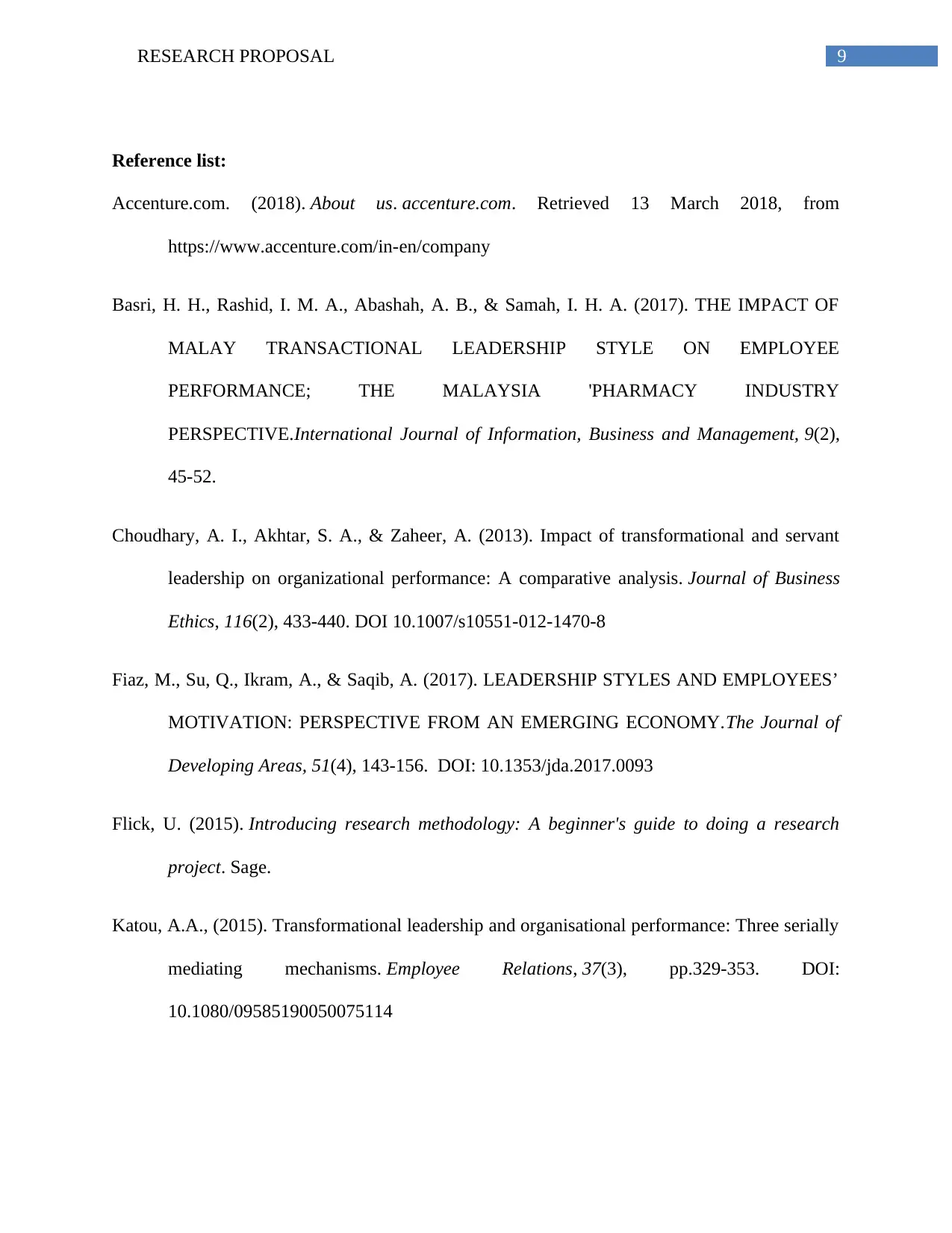
9RESEARCH PROPOSAL
Reference list:
Accenture.com. (2018). About us. accenture.com. Retrieved 13 March 2018, from
https://www.accenture.com/in-en/company
Basri, H. H., Rashid, I. M. A., Abashah, A. B., & Samah, I. H. A. (2017). THE IMPACT OF
MALAY TRANSACTIONAL LEADERSHIP STYLE ON EMPLOYEE
PERFORMANCE; THE MALAYSIA 'PHARMACY INDUSTRY
PERSPECTIVE.International Journal of Information, Business and Management, 9(2),
45-52.
Choudhary, A. I., Akhtar, S. A., & Zaheer, A. (2013). Impact of transformational and servant
leadership on organizational performance: A comparative analysis. Journal of Business
Ethics, 116(2), 433-440. DOI 10.1007/s10551-012-1470-8
Fiaz, M., Su, Q., Ikram, A., & Saqib, A. (2017). LEADERSHIP STYLES AND EMPLOYEES’
MOTIVATION: PERSPECTIVE FROM AN EMERGING ECONOMY.The Journal of
Developing Areas, 51(4), 143-156. DOI: 10.1353/jda.2017.0093
Flick, U. (2015). Introducing research methodology: A beginner's guide to doing a research
project. Sage.
Katou, A.A., (2015). Transformational leadership and organisational performance: Three serially
mediating mechanisms. Employee Relations, 37(3), pp.329-353. DOI:
10.1080/09585190050075114
Reference list:
Accenture.com. (2018). About us. accenture.com. Retrieved 13 March 2018, from
https://www.accenture.com/in-en/company
Basri, H. H., Rashid, I. M. A., Abashah, A. B., & Samah, I. H. A. (2017). THE IMPACT OF
MALAY TRANSACTIONAL LEADERSHIP STYLE ON EMPLOYEE
PERFORMANCE; THE MALAYSIA 'PHARMACY INDUSTRY
PERSPECTIVE.International Journal of Information, Business and Management, 9(2),
45-52.
Choudhary, A. I., Akhtar, S. A., & Zaheer, A. (2013). Impact of transformational and servant
leadership on organizational performance: A comparative analysis. Journal of Business
Ethics, 116(2), 433-440. DOI 10.1007/s10551-012-1470-8
Fiaz, M., Su, Q., Ikram, A., & Saqib, A. (2017). LEADERSHIP STYLES AND EMPLOYEES’
MOTIVATION: PERSPECTIVE FROM AN EMERGING ECONOMY.The Journal of
Developing Areas, 51(4), 143-156. DOI: 10.1353/jda.2017.0093
Flick, U. (2015). Introducing research methodology: A beginner's guide to doing a research
project. Sage.
Katou, A.A., (2015). Transformational leadership and organisational performance: Three serially
mediating mechanisms. Employee Relations, 37(3), pp.329-353. DOI:
10.1080/09585190050075114
Paraphrase This Document
Need a fresh take? Get an instant paraphrase of this document with our AI Paraphraser
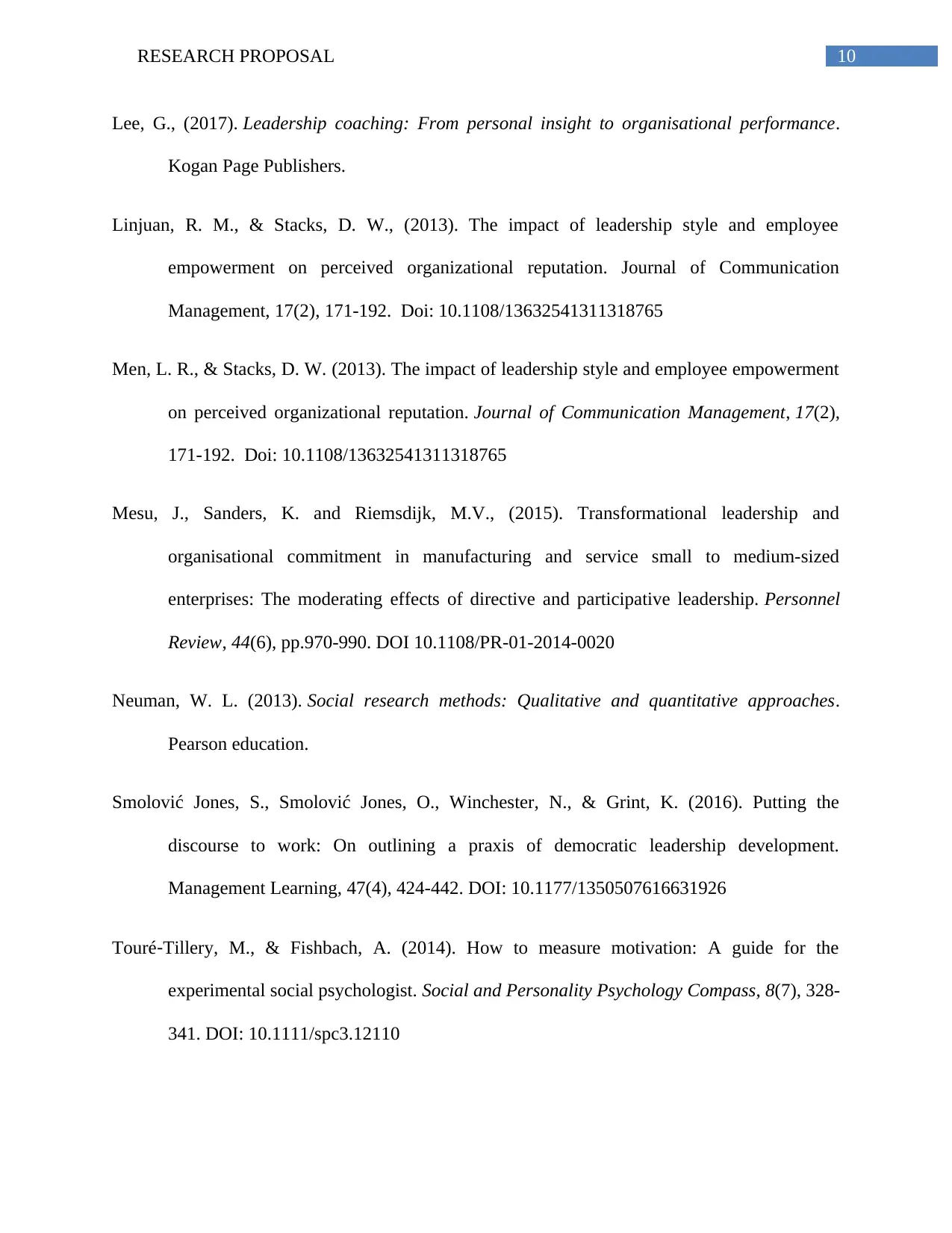
10RESEARCH PROPOSAL
Lee, G., (2017). Leadership coaching: From personal insight to organisational performance.
Kogan Page Publishers.
Linjuan, R. M., & Stacks, D. W., (2013). The impact of leadership style and employee
empowerment on perceived organizational reputation. Journal of Communication
Management, 17(2), 171-192. Doi: 10.1108/13632541311318765
Men, L. R., & Stacks, D. W. (2013). The impact of leadership style and employee empowerment
on perceived organizational reputation. Journal of Communication Management, 17(2),
171-192. Doi: 10.1108/13632541311318765
Mesu, J., Sanders, K. and Riemsdijk, M.V., (2015). Transformational leadership and
organisational commitment in manufacturing and service small to medium-sized
enterprises: The moderating effects of directive and participative leadership. Personnel
Review, 44(6), pp.970-990. DOI 10.1108/PR-01-2014-0020
Neuman, W. L. (2013). Social research methods: Qualitative and quantitative approaches.
Pearson education.
Smolović Jones, S., Smolović Jones, O., Winchester, N., & Grint, K. (2016). Putting the
discourse to work: On outlining a praxis of democratic leadership development.
Management Learning, 47(4), 424-442. DOI: 10.1177/1350507616631926
Touré‐Tillery, M., & Fishbach, A. (2014). How to measure motivation: A guide for the
experimental social psychologist. Social and Personality Psychology Compass, 8(7), 328-
341. DOI: 10.1111/spc3.12110
Lee, G., (2017). Leadership coaching: From personal insight to organisational performance.
Kogan Page Publishers.
Linjuan, R. M., & Stacks, D. W., (2013). The impact of leadership style and employee
empowerment on perceived organizational reputation. Journal of Communication
Management, 17(2), 171-192. Doi: 10.1108/13632541311318765
Men, L. R., & Stacks, D. W. (2013). The impact of leadership style and employee empowerment
on perceived organizational reputation. Journal of Communication Management, 17(2),
171-192. Doi: 10.1108/13632541311318765
Mesu, J., Sanders, K. and Riemsdijk, M.V., (2015). Transformational leadership and
organisational commitment in manufacturing and service small to medium-sized
enterprises: The moderating effects of directive and participative leadership. Personnel
Review, 44(6), pp.970-990. DOI 10.1108/PR-01-2014-0020
Neuman, W. L. (2013). Social research methods: Qualitative and quantitative approaches.
Pearson education.
Smolović Jones, S., Smolović Jones, O., Winchester, N., & Grint, K. (2016). Putting the
discourse to work: On outlining a praxis of democratic leadership development.
Management Learning, 47(4), 424-442. DOI: 10.1177/1350507616631926
Touré‐Tillery, M., & Fishbach, A. (2014). How to measure motivation: A guide for the
experimental social psychologist. Social and Personality Psychology Compass, 8(7), 328-
341. DOI: 10.1111/spc3.12110
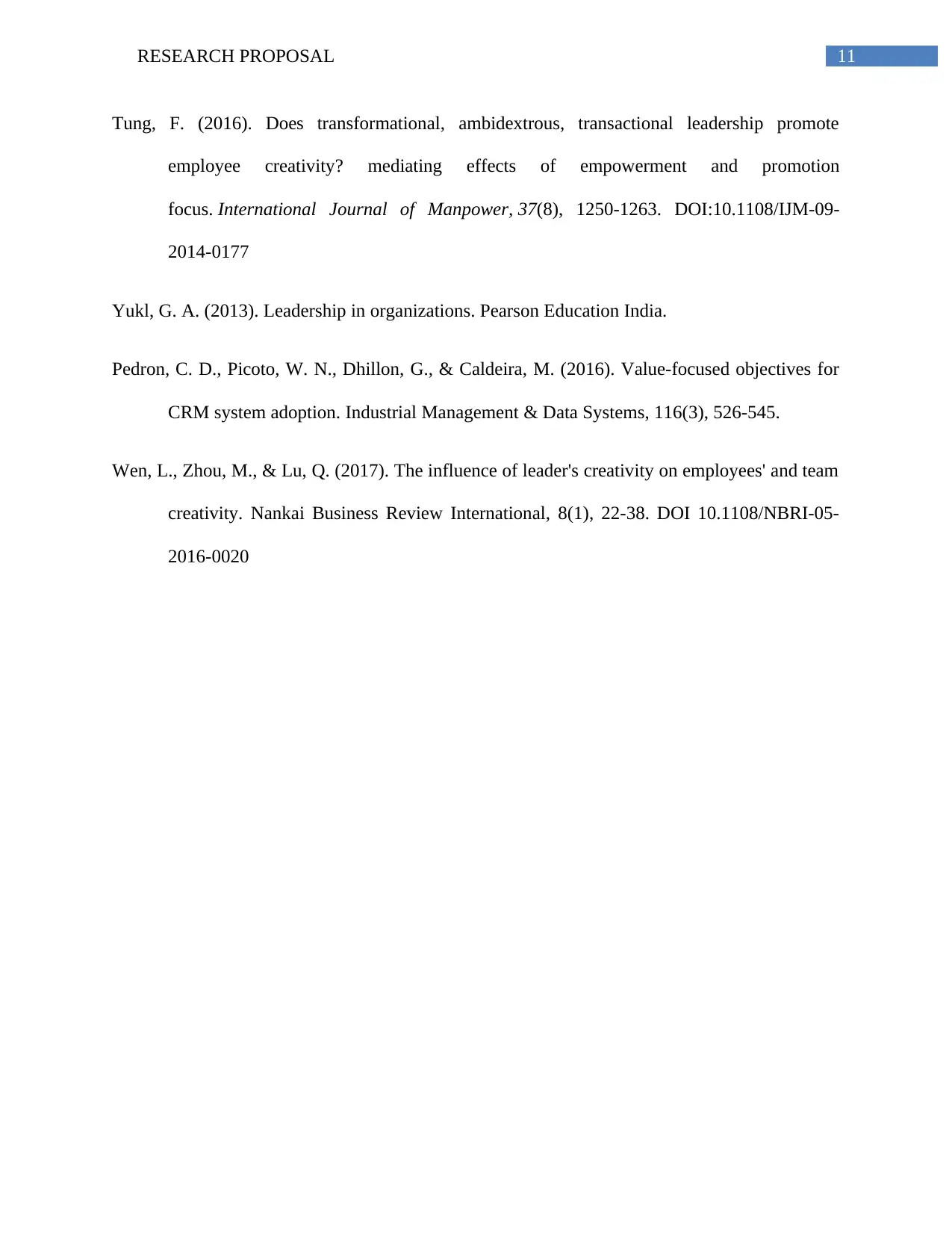
11RESEARCH PROPOSAL
Tung, F. (2016). Does transformational, ambidextrous, transactional leadership promote
employee creativity? mediating effects of empowerment and promotion
focus. International Journal of Manpower, 37(8), 1250-1263. DOI:10.1108/IJM-09-
2014-0177
Yukl, G. A. (2013). Leadership in organizations. Pearson Education India.
Pedron, C. D., Picoto, W. N., Dhillon, G., & Caldeira, M. (2016). Value-focused objectives for
CRM system adoption. Industrial Management & Data Systems, 116(3), 526-545.
Wen, L., Zhou, M., & Lu, Q. (2017). The influence of leader's creativity on employees' and team
creativity. Nankai Business Review International, 8(1), 22-38. DOI 10.1108/NBRI-05-
2016-0020
Tung, F. (2016). Does transformational, ambidextrous, transactional leadership promote
employee creativity? mediating effects of empowerment and promotion
focus. International Journal of Manpower, 37(8), 1250-1263. DOI:10.1108/IJM-09-
2014-0177
Yukl, G. A. (2013). Leadership in organizations. Pearson Education India.
Pedron, C. D., Picoto, W. N., Dhillon, G., & Caldeira, M. (2016). Value-focused objectives for
CRM system adoption. Industrial Management & Data Systems, 116(3), 526-545.
Wen, L., Zhou, M., & Lu, Q. (2017). The influence of leader's creativity on employees' and team
creativity. Nankai Business Review International, 8(1), 22-38. DOI 10.1108/NBRI-05-
2016-0020
⊘ This is a preview!⊘
Do you want full access?
Subscribe today to unlock all pages.

Trusted by 1+ million students worldwide
1 out of 12
Related Documents
Your All-in-One AI-Powered Toolkit for Academic Success.
+13062052269
info@desklib.com
Available 24*7 on WhatsApp / Email
![[object Object]](/_next/static/media/star-bottom.7253800d.svg)
Unlock your academic potential
Copyright © 2020–2026 A2Z Services. All Rights Reserved. Developed and managed by ZUCOL.





